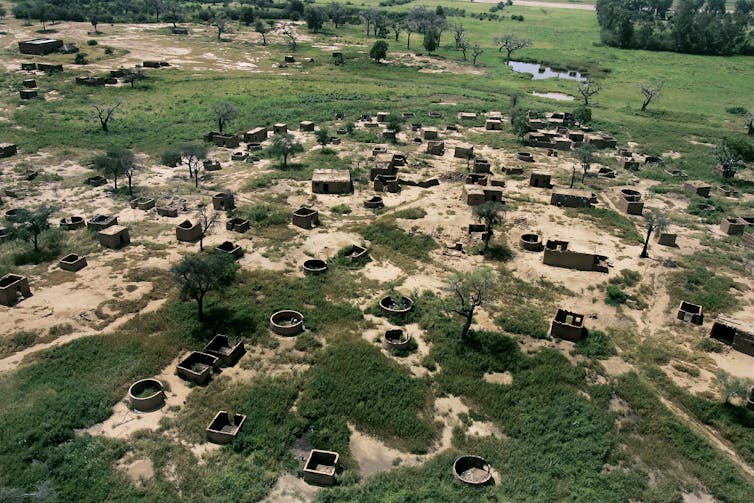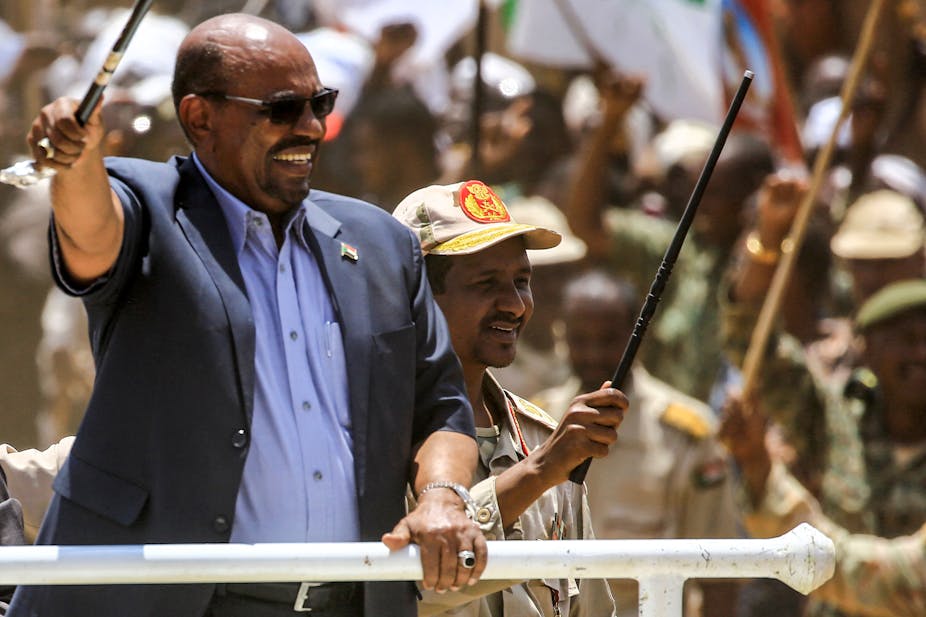I asked the pilot to deviate from our approved flight path and go low over Darfur. It was 2003 and I was the United Nations Humanitarian and Resident Coordinator in Sudan investigating reports of violence. What I saw was a genocide unfolding on my watch.
This was a decade after the 1994 Rwanda genocide, which I also witnessed first hand, and where we had sworn “never again”. But here I was in Darfur watching village upon village burning.
Large-scale horrendous brutalities were being committed across Darfur, a region in western Sudan that’s roughly the size of France. They were racially directed, targeting black African ethnic groups such as the Fur, Zaghawa and Masalit. Eyewitness testimonies indicated that the perpetrators were Arab militia, with Sudanese government backing. The purpose was the permanent removal of the black population in the area so that nomadic Arabs could take over.
Sudan’s insidious racism has deep roots. It goes back to its ancient role as a marketplace for black slaves. The subsequent divide-and-rule Anglo-Egyptian colonialism and supremacist Arab militarised dictatorships further entrenched it.

Between 2003 and 2005, half of Darfur’s population of 5-6 million was displaced. Their fragile means for surviving the arid environment – such as wells and irrigated farming – were completely destroyed. At least 200,000 Darfuris died, and thousands of women and girls were raped.
This was intentional – as was confirmed by Sudanese authorities with whom I remonstrated. When they told me that they wanted a “final solution” to the Darfur insurgency, I was left in no doubt that the 1948 Genocide Convention – which prohibits ethnically targeted destruction – applied.
The UN and world powers refused to listen and I lost my job for speaking out publicly. But extensive lobbying extracted a UN Security Council presidential statement in 2004, and the first-ever UN Security Council referral to the International Criminal Court in 2005. This meant that the court could exercise jurisdiction over Sudan and initiate formal investigations.
It was gratifying to provide evidence that enabled Omar al-Bashir to enter history in 2009 and 2010 as the first head of state indicted for genocide, crimes against humanity and war crimes. He was alongside five other associates who obstructed us in bringing relief to Darfur.
But this was no consolation. Bashir remained in power despite international arrest warrants.
Meanwhile, Darfuri lands, emptied of their African inhabitants, were rehabilitated with generous foreign aid and re-populated by Arab groups. With the demography of the region changed, this is a clear example of ethnic cleansing.
As an expert in humanitarian affairs, with particular expertise in tackling crimes against humanity, disaster and conflict management, I argue that without restorative justice – justice that focuses on repairing the harm caused by involving those who have been affected – there cannot be peace.
The failure to hold Darfur rights abusers accountable emboldened the national government and security apparatus to redouble their oppression around Sudan. This ignited several violent rebellions and inevitable countrywide instability. In fact, the crisis in Sudan today involves key military players who rose to power under Bashir during this time.
Darfur’s toxic legacy
In 2013, as a Special Representative of the Aegis Trust for the Prevention of Crimes against Humanity, I witnessed in the Nuba Mountains of South Kordofan state the scorched-earth policies of its governor, Ahmed Harun. He was a close associate of Bashir. Even though Harun had been indicted by the ICC in 2007, he carried out new ethnically targeted crimes against black Africans of the Nuba and in Blue Nile state. His tactics were further brutal refinements of what he had deployed in Darfur a decade earlier.
Bashir and Harun effected the original Darfur genocide through their Janjaweed militia, alongside the Sudanese Armed Forces. The Janjaweed were then formalised into the Rapid Support Forces. They were strengthened through European Union (EU) funding for border control to stem refugee flows into Europe. They gained further combat experience and money by being recruited to fight in Yemen.
The international community’s pragmatic Sudan policy has favoured quick fixes rather than systematically tackling underlying problems. Competitive self-interests are also in play as nations vie for access to Sudan’s oil, mineral and agricultural riches. And so, deal-making trumped principles to boost the perpetrators instead of demanding their accountability.
Sudan’s military elites triumphed further when the international community undermined the popular pro-democracy uprising that led to Bashir’s removal in 2019. In a massive policy error, the UN, US and EU pushed for a transition that left Bashir’s military successors in control: Chief General Abdel Fattah al-Burhan for the Sudanese Armed Forces, and Commander General Mohamed Hamdan Dagalo – aka Hemedti – for the Rapid Support Forces.
The violent power competition between these two generals is the immediate trigger to Sudan’s current conflict. There are catastrophic humanitarian consequences amid peace mediations that repeatedly fail.
Making peace
Peacemaking is never easy, but conflicts hallmarked by war crimes and crimes against humanity are impossible to end without restorative justice. Extraordinary hurts necessitate exceptional journeys of recovery through grieving, forgiving and healing. That requires acknowledging wrongs done, penalising wrongdoers, compensating victims and memorialising their suffering through monuments that become places of pilgrimage to educate future generations.
That is how the Nuremberg Tribunal helped post-Nazi Germany and Europe to move on. And how the International Criminal Tribunal for the Former Yugoslavia strove to heal the Balkans from the 1995 Srebrenica genocide.
Justice is best served closest to the people who suffer but, at the same time, crimes against humanity in one place are crimes against all humanity everywhere. So, the whole world must be part of legal processes that ensure transparency and fairness, provide lessons and reset global norms. The tribunals for the 1970s Cambodian and 1994 Rwandan genocides did that with hybrid domestic and international mechanisms.
Where this does not happen, old wounds fester, even ancient ones such as those from the Armenian genocide a century ago or the 1930s Holodomor genocide of Ukrainians. More recently, the unrectified genocides of the Rohingya, Yazidi and Uyghur, and in Tigray continue to cause turmoil and encourage impunity. That is why “never again” is happening “again and again”.
Shabby peace deals
There is no shortage of mediators for Sudan’s current crisis. But their impatient peace panaceas underestimate the impact of the generation-long Darfur genocide and its direct connection to current events. Shabby deals for short-term gains – appeasing the generals and further consolidating their power at the cost of civilian democracy – will unravel.
The bulk of the Sudanese at the centre, dominated by an Arabic elite – authorities, intelligentsia, rich – ignored the generation-long inhumanities at the peripheries of their vast land. But, sooner or later, there is no alternative to the path to peace in Sudan that is walked hand-in-hand by all its diverse peoples.
This will be a long journey. Short-changing justice and accountability will make it longer still. The handover of Bashir and other indictees to the International Criminal Court for crimes against humanity in Darfur should be integral to all peace negotiations, and a condition for aiding recovery. Furthermore, fresh crimes being committed in the current conflict must not go unpunished.
Sudan’s stakeholders in Africa, the Middle East and globally serve the nation best – and also their own self-interests – by not standing in the way of peace through justice.

